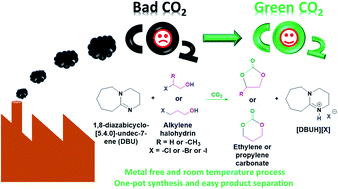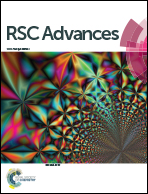Metal free synthesis of ethylene and propylene carbonate from alkylene halohydrin and CO2 at room temperature†
Abstract
Herein we describe a metal free and one-pot pathway for the synthesis of industrially important cyclic carbonates such as ethylene carbonate (EC) and propylene carbonates (PC) from molecular CO2 under mild reaction conditions. In the actual synthesis, the alkylene halohydrins such as alkylene chloro- or bromo or iodohydrin and organic superbase, 1,8-diazabicyclo-[5.4.0]-undec-7-ene (DBU) reacted equivalently with CO2 at room temperature. The syntheses of cyclic carbonates were performed in DMSO as a solvent. Both 1,2 and 1,3 halohydrin precursors were converted into cyclic carbonates except 2-bromo- and iodoethanol, which were reacted equivalently with DBU through n-alkylation and formed corresponding n-alkylated DBU salts instead of forming cyclic carbonates. NMR analysis was used to identify the reaction components in the reaction mixture whereas this technique was also helpful in terms of understanding the reaction mechanism of cyclic carbonate formation. The mechanistic study based on the NMR analysis studies confirmed that prior to the formation of cyclic carbonate, a switchable ionic liquid (SIL) formed in situ from alkylene chlorohydrin, DBU and CO2. As a representative study, the synthesis of cyclic carbonates from 1,2 chlorohydrins was demonstrated where the synthesis was carried out using chlorohydrin as a solvent as well as a reagent. In this case, alkylene chlorohydrin as a solvent not only replaced DMSO in the synthesis but also facilitated an efficient separation of the reaction components from the reaction mixture. The EC or PC, [DBUH][Cl] as well as an excess of the alkylene chlorhydrin were separated from each other following solvent extraction and distillation approaches. In this process, with the applied reaction conditions, >90% yields of EC and PC were achieved. Meanwhile, DBU was recovered from in situ formed [DBUH][Cl] by using NaCl saturated alkaline solution. Most importantly here, we developed a metal free, industrially feasible CO2 capture and utilization approach to obtain EC and PC under mild reaction conditions.



 Please wait while we load your content...
Please wait while we load your content...